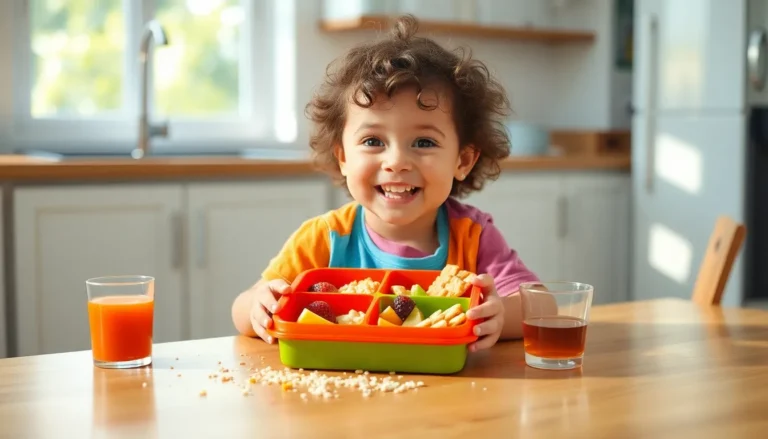Table of Contents
ToggleEvery parent knows that moment when their little one finally utters their first word. It’s like winning the lottery but without the cash prize—just a whole lot of joy and maybe a little confusion. From “mama” to “uh-oh,” these tiny verbal triumphs mark the beginning of a language journey that’s as entertaining as it is enlightening.
But what’s behind those adorable first words? Understanding this milestone not only helps parents appreciate their child’s development but also prepares them for the delightful chaos that follows. After all, once they start talking, there’s no turning back. Get ready for a whirlwind of questions, requests, and the occasional “why?” that’ll keep parents on their toes. Dive in to discover the magic of toddler first words and how they shape communication for years to come.
Understanding Toddler First Words
Toddler first words mark a significant milestone in language development. Recognizing their importance encourages active support and engagement from parents.
Importance of First Words
First words lay the foundation for communication skills. With each spoken word, a toddler connects with their world, expressing thoughts and feelings. Pronouncing words helps them understand language, fostering emotional development. Additionally, early words promote social interaction, encouraging toddlers to engage with caregivers. Research shows that early verbal skills correlate with later literacy and educational achievements, reinforcing the long-term benefits of nurturing language.
Common Milestones
Milestones in toddler speech vary, but certain patterns emerge. By around twelve months, many children utter simple words like “mama” and “dada.” As they approach eighteen months, vocabulary often expands to fifty words or more. Between twenty to twenty-four months, toddlers begin forming two-word phrases, indicating a growing grasp of syntax. Caregivers can track these milestones using guidelines from pediatric experts, ensuring timely support when needed. Understanding these developments allows adults to nurture a child’s language acquisition effectively.
Factors Influencing First Words

Multiple factors influence a toddler’s first words. Understanding these can help caregivers support language growth effectively.
Age and Developmental Stages
Age plays a significant role in speech development. By twelve months, many children begin uttering simple words like “mama” and “dada.” Most toddlers expand their vocabulary by eighteen months, with the ability to say around fifty words. As they approach twenty to twenty-four months, they start forming two-word phrases, showcasing enhanced language comprehension. Developmental milestones provide a framework for tracking progress, offering insights into when specific words typically emerge.
Environmental Influences
Environment impacts language acquisition greatly. Exposure to verbal interactions promotes word learning. For instance, engaging conversations with caregivers, reading books, and singing songs enrich a child’s vocabulary. Interaction with peers also fosters language use in social settings. Environments filled with sounds and words encourage toddlers to mimic and practice speech. Parents and caregivers can create supportive atmospheres that stimulate verbal communication, enhancing a child’s ability to acquire first words naturally.
Encouraging Toddler First Words
Encouragement plays a vital role in helping toddlers reach their first words. Engaging activities and caregiver involvement significantly influence this developmental milestone.
Activities to Support Language Development
Interactive play stimulates language growth. Reading colorful books introduces new vocabulary and concepts. Singing catchy nursery rhymes fosters phonetic awareness. Engaging in simple games encourages toddlers to mimic sounds, enhancing verbal skills. Naming objects during everyday routines reinforces language learning. Providing opportunities for toddlers to express themselves builds confidence in their communication abilities.
The Role of Parents and Caregivers
Parents and caregivers serve as primary language role models. Speaking clearly and using rich language exposes toddlers to varied vocabulary. Asking open-ended questions encourages longer responses, promoting conversation. Listening attentively shows toddlers that their words matter, boosting engagement. Consistent communication in daily life establishes a strong foundation for future language use. Positive reinforcement motivates toddlers to experiment with new words.
Challenges in Language Development
Language development faces various challenges that can affect a toddler’s ability to communicate effectively. Addressing these challenges helps ensure a smoother progression toward vocabulary growth.
Speech Delays
Speech delays can arise for a number of reasons, including developmental disorders or hearing impairments. Some toddlers may not meet typical milestones, such as saying simple words by twelve months or expanding vocabulary by eighteen months. Identifying delays early allows for timely intervention and support. Engaging in daily routines that encourage speech can significantly help. Regularly providing verbal input and opportunities for practice increases the likelihood of progress.
When to Seek Professional Help
Parents and caregivers should seek professional help if concerns about speech development arise. Signs that warrant evaluation include a lack of first words by fifteen months or minimal progress in language skills by twenty-four months. Consulting a speech-language pathologist can provide tailored strategies and assessments. Early intervention maximizes the potential for positive outcomes. Regular check-ups that include language milestones contribute to effective monitoring of a child’s development.
The journey of a toddler’s first words is a remarkable milestone that shapes their communication skills and emotional growth. By fostering a supportive and engaging environment, parents and caregivers can significantly influence their child’s language development. Encouragement and active participation in daily activities play a pivotal role in helping toddlers express themselves.
Tracking speech milestones and addressing any challenges promptly ensures that children receive the necessary support for their language journey. As they explore the world of words, these early verbal achievements pave the way for richer conversations and deeper connections. Embracing this exciting phase not only enhances a child’s vocabulary but also strengthens the bond between caregivers and their little ones.




